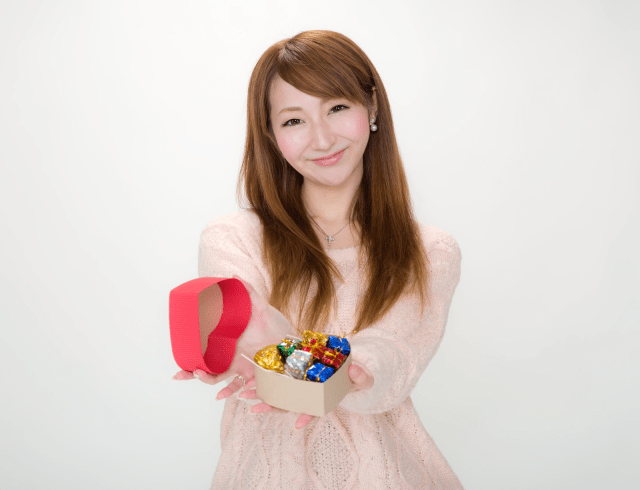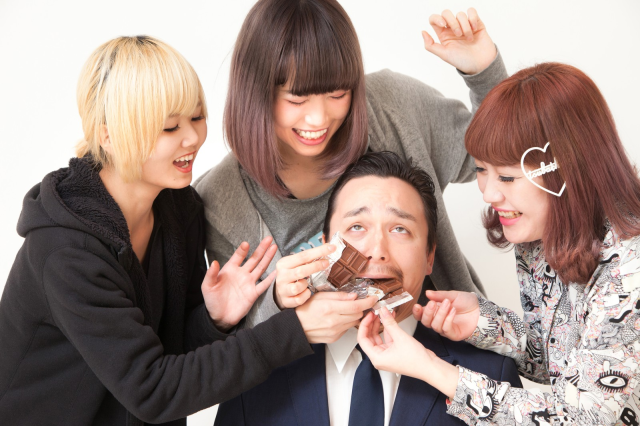
Is it worth feeling obligated if the gesture isn’t much obliged?
In Japan, women are the ones who give presents for Valentine’s Day, and the presents are chocolates. There are actually two different major classes of Valentine’s Day chocolate in Japan: Honmei choco and giri choco.
Honmei means “favorite” (in the sense of “expected winner”), and so honmei choco is what a woman gives to a guy she’s actually got romantic feelings for. Giri, meanwhile, means “duty” or “obligation,” and so giri choco are the gifts of chocolate women give to bosses, coworkers, or other acquaintances as a social nicety.
In recent years, there’s been renewed discussion of the obligation chocolate practice, some of it spurred by foreign companies operating in Japan. Some say the practice is chauvinistic, outdated, and unfair to women, while others (including women who like giving giri choco), say it’s a thoughtful gesture to say thank you for all the little courtesies someone has done for you during the year, and also simply an opportunity to make someone else feel good.
But while the question of whether or not giving obligation chocolate is a good idea is worth considering, there’s another matter to take into account: Do guys even want it?
To try to find out, Japanese research firm Nihon Trend Research conducted an online poll, asking 500 men if they’re happy when they receive obligation chocolate. When the responses were tallied, they were split right down the middle, with 50 percent of the guys saying they liked getting giri choco, and the other 50 percent saying they didn’t.
When asked why, some guys said that they simply don’t like chocolate, and so a sudden sugary snack supply isn’t anything they’re honestly hoping for. Another said getting giri choco drives home the depressing reality that he’s got no special someone in his life giving him honmei choco. And finally, those in the “thanks, but no thanks” group pointed out that getting obligation chocolate from a woman means you’re obligated to give her some sort of return gift a month later on March 14, which is called White Day in Japan. Even if you try to buy something that’s of roughly the same value as the giri choco you received, the effect is still the same as going out and buying chocolate for yourself, just with the order reversed (you get the chocolate first, then spend money a month later), something many of the guys wouldn’t be interested in doing in the first place.
On the other hand, obligation chocolate is quite a bit more popular among women. While it’s not the norm, in recent years an increasing number of women in Japan have been buying Valentine’s Day obligation chocolate for female friends and coworkers. When Nihon Trend Research asked 500 women how they felt about receiving giri choco, 68,2 percent said it would make them happy, which gels with other research on the topic.
Of course, a 50-50 split for the guys means that there are still plenty of dudes for whom getting some giri choco is a bright spot in their Valentine’s Day, so for those who like the idea of expressing their gratitude with sweets, it’s not a universally bad idea. But taking into consideration the intended recipients’ tastes and personality is probably a good idea, lest you burden yourself with an obligation you don’t really need to.
Source: Value Press
Top image: Pakutaso
Insert images: Pakutaso (1, 2)
● Want to hear about SoraNews24’s latest articles as soon as they’re published? Follow us on Facebook and Twitter!
[ Read in Japanese ]



 Survey shows Japanese women would love to be getting some chocolate on Valentine’s Day too
Survey shows Japanese women would love to be getting some chocolate on Valentine’s Day too Giri? Tomo? Gyaku? A guide to Japan’s many different kinds of Valentine’s Day chocolate
Giri? Tomo? Gyaku? A guide to Japan’s many different kinds of Valentine’s Day chocolate Tokyo opens entire store dedicated to helping women buy obligation chocolate for Valentine’s
Tokyo opens entire store dedicated to helping women buy obligation chocolate for Valentine’s Japanese women explain why they give “obligation chocolate” to male coworkers on Valentine’s Day
Japanese women explain why they give “obligation chocolate” to male coworkers on Valentine’s Day This Valentine’s Day, tell him you don’t love him with Japanese women’s “chocolate maggot” recipe
This Valentine’s Day, tell him you don’t love him with Japanese women’s “chocolate maggot” recipe Starbucks Japan releases first-ever Hinamatsuri Girls’ Day Frappuccino
Starbucks Japan releases first-ever Hinamatsuri Girls’ Day Frappuccino “Disaster”: 2018 Kanji of the Year unveiled by Buddhist monk at Kiyomizudera temple in Kyoto
“Disaster”: 2018 Kanji of the Year unveiled by Buddhist monk at Kiyomizudera temple in Kyoto Potama serves up epic rice balls like no other, and there’s only one store in Tokyo
Potama serves up epic rice balls like no other, and there’s only one store in Tokyo Eevee returns to Japan’s famous Tokyo Banana, bundled with a cute tote bag
Eevee returns to Japan’s famous Tokyo Banana, bundled with a cute tote bag Foreign tourists in Japan will get free Shinkansen tickets to promote regional tourism
Foreign tourists in Japan will get free Shinkansen tickets to promote regional tourism The best Hobonichi diaries, covers and stationery for 2026
The best Hobonichi diaries, covers and stationery for 2026 Yakuzen ramen restaurant in Tokyo is very different to a yakuza ramen restaurant
Yakuzen ramen restaurant in Tokyo is very different to a yakuza ramen restaurant Video claims that if you can read a certain font, you are probably not Japanese【Video】
Video claims that if you can read a certain font, you are probably not Japanese【Video】 Osaka establishes first designated smoking area in Dotonbori canal district to fight “overtourism”
Osaka establishes first designated smoking area in Dotonbori canal district to fight “overtourism” Tokyo Station staff share their top 10 favorite ekiben
Tokyo Station staff share their top 10 favorite ekiben Japanese restaurant chain serves Dragon Ball donuts and Senzu Beans this spring
Japanese restaurant chain serves Dragon Ball donuts and Senzu Beans this spring Highest Starbucks in Japan set to open this spring in the Tokyo sky
Highest Starbucks in Japan set to open this spring in the Tokyo sky Tokyo Skytree turns pink for the cherry blossom season
Tokyo Skytree turns pink for the cherry blossom season Japan Extreme Budget Travel! A trip from Tokyo to Izumo for just 30,000 yen [Part 1]
Japan Extreme Budget Travel! A trip from Tokyo to Izumo for just 30,000 yen [Part 1] Japan has only one airport named after a samurai, so let’s check out Kochi Ryoma【Photos】
Japan has only one airport named after a samurai, so let’s check out Kochi Ryoma【Photos】 Japanese drugstore sells onigiri at pre-stupid era prices, but how do they compare to 7-Eleven?
Japanese drugstore sells onigiri at pre-stupid era prices, but how do they compare to 7-Eleven? Japan Extreme Budget Travel! A trip from Tokyo to Izumo for just 30,000 yen [Part 2]
Japan Extreme Budget Travel! A trip from Tokyo to Izumo for just 30,000 yen [Part 2] Adorable Totoro acorn key holders come with a special guest hidden inside[Photos]
Adorable Totoro acorn key holders come with a special guest hidden inside[Photos] Japan’s newest Shinkansen has no seats…or passengers [Video]
Japan’s newest Shinkansen has no seats…or passengers [Video] Starbucks Japan releases new sakura goods and drinkware for cherry blossom season 2026
Starbucks Japan releases new sakura goods and drinkware for cherry blossom season 2026 Foreigners accounting for over 80 percent of off-course skiers needing rescue in Japan’s Hokkaido
Foreigners accounting for over 80 percent of off-course skiers needing rescue in Japan’s Hokkaido Super-salty pizza sends six kids to the hospital in Japan, linguistics blamed
Super-salty pizza sends six kids to the hospital in Japan, linguistics blamed Starbucks Japan unveils new sakura Frappuccino for cherry blossom season 2026
Starbucks Japan unveils new sakura Frappuccino for cherry blossom season 2026 The 10 most annoying things foreign tourists do on Japanese trains, according to locals
The 10 most annoying things foreign tourists do on Japanese trains, according to locals Take a trip to Japan’s Dododo Land, the most irritating place on Earth
Take a trip to Japan’s Dododo Land, the most irritating place on Earth Naruto and Converse team up for new line of shinobi sneakers[Photos]
Naruto and Converse team up for new line of shinobi sneakers[Photos] Is China’s don’t-go-to-Japan warning affecting the lines at a popular Tokyo gyukatsu restaurant?
Is China’s don’t-go-to-Japan warning affecting the lines at a popular Tokyo gyukatsu restaurant? Survey asks foreign tourists what bothered them in Japan, more than half gave same answer
Survey asks foreign tourists what bothered them in Japan, more than half gave same answer Japan’s human washing machines will go on sale to general public, demos to be held in Tokyo
Japan’s human washing machines will go on sale to general public, demos to be held in Tokyo Starbucks Japan releases new drinkware and goods for Valentine’s Day
Starbucks Japan releases new drinkware and goods for Valentine’s Day We deeply regret going into this tunnel on our walk in the mountains of Japan
We deeply regret going into this tunnel on our walk in the mountains of Japan Studio Ghibli releases Kodama forest spirits from Princess Mononoke to light up your home
Studio Ghibli releases Kodama forest spirits from Princess Mononoke to light up your home Major Japanese hotel chain says reservations via overseas booking sites may not be valid
Major Japanese hotel chain says reservations via overseas booking sites may not be valid Put sesame oil in your coffee? Japanese maker says it’s the best way to start your day【Taste test】
Put sesame oil in your coffee? Japanese maker says it’s the best way to start your day【Taste test】 No more using real katana for tourism activities, Japan’s National Police Agency says
No more using real katana for tourism activities, Japan’s National Police Agency says Is the coronavirus going to kill Japan’s obligation chocolate Valentine’s Day custom?
Is the coronavirus going to kill Japan’s obligation chocolate Valentine’s Day custom? Godiva takes swipe at Japan’s obligation chocolate king, Tokyo chocolatier fights fire with smile
Godiva takes swipe at Japan’s obligation chocolate king, Tokyo chocolatier fights fire with smile Godiva runs full-page ad asking Japanese women to stop buying so much Valentine’s chocolate
Godiva runs full-page ad asking Japanese women to stop buying so much Valentine’s chocolate Only one demographic in survey is happy about Japan’s workplace obligation Valentine’s chocolate
Only one demographic in survey is happy about Japan’s workplace obligation Valentine’s chocolate How much Valentine’s Day chocolate do Japanese schoolgirls give, and to who?【Survey】
How much Valentine’s Day chocolate do Japanese schoolgirls give, and to who?【Survey】 Don’t bother, ladies: Survey reveals most Japanese guys don’t want your Valentine’s chocolate
Don’t bother, ladies: Survey reveals most Japanese guys don’t want your Valentine’s chocolate Black Thunder shocks fans by suspending giri choco obligation chocolates on Valentine’s Day
Black Thunder shocks fans by suspending giri choco obligation chocolates on Valentine’s Day Survey reveals Japanese men really want home-made chocolate, but are women willing to make it?
Survey reveals Japanese men really want home-made chocolate, but are women willing to make it? Giri obligation chocolates seen as power harassment, more Japanese companies ban practice
Giri obligation chocolates seen as power harassment, more Japanese companies ban practice Barely half of Japanese men in survey will give thank-you gift to women for Valentine’s chocolate
Barely half of Japanese men in survey will give thank-you gift to women for Valentine’s chocolate President of Japan’s obligation chocolate king sends personal letter to giri choco-hater Godiva
President of Japan’s obligation chocolate king sends personal letter to giri choco-hater Godiva Japanese women showing rebounding interest in giving Valentine’s Day chocolate【Survey】
Japanese women showing rebounding interest in giving Valentine’s Day chocolate【Survey】 Survey suggests Tokyo women expect men to spend big on Valentine’s Day return gifts
Survey suggests Tokyo women expect men to spend big on Valentine’s Day return gifts Give your loved ones stag beetle larvae and more this Valentine’s
Give your loved ones stag beetle larvae and more this Valentine’s Japanese women encouraged to give boyfriends sexy underwear and loaf of bread for Valentine’s Day
Japanese women encouraged to give boyfriends sexy underwear and loaf of bread for Valentine’s Day